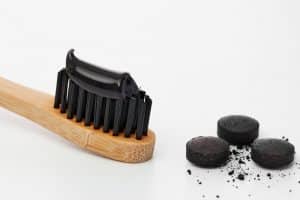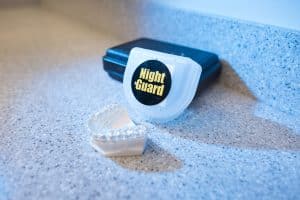Posted by: Maplewood Dental Arts in Family Dentist
“Ask the Doctor” – Whitening, Teeth Grinding and a Charcoal Toothbrush

We loved your questions this month on our “Asked the Doctor” Facebook post! Dr. Taliento got to shared her answers with our followers in real time. It was such a big success we’ll make it a regular feature. Like and follow us on Facebook to submit your questions and please enjoy this compilation of the Q & A we got this month!
Q: What are your thoughts on charcoal toothbrush?

A: “There are no long-term studies that exist to prove that activated charcoal has any measurable dental hygiene-related benefits at all” and The Journal of the American Dental Association recently published research (a literature review and here is the link) saying there is no evidence of safety or effectiveness of charcoal dental products (mainly toothpastes, whitening products or toothbrushes). The supposed “toxin binding” properties of charcoal have not been shown or been proven to whiten teeth like it claims and the charcoal itself can be FAR too abrasive for the enamel of teeth and the surrounding gum tissue that it can actually do fairly significant harm long-term, especially if used incorrectly. And the charcoal toothbrush bristles are much more stiff and have a larger surface area with the charcoal and would be way too hard and abrasive compared to the recommended soft bristle manual or electric toothbrushes. It is considered by most dental professionals as of now to be mostly a gimmick and I would advise to use with caution until more studies are available, however I even caution my patients to not use whitening toothpastes long-term due to their increased abrasiveness compared to regular toothpastes (to only use intermittently when you want to whiten your smile but not use as your regular toothpaste), and charcoal is much, much more abrasive than over the counter, brand name whitening toothpastes, so in my opinion it would not be a good idea to use charcoal toothpaste or toothbrushes for any extended period of time or it is almost certain you will do harm to your teeth and gums. If you have more questions regarding this topic, please feel free to contact us at any time! Thanks so much for your question! This has been a popular one as of late as it is heavily advertised on social media and the internet in general. We appreciate you taking the time to ask.
Q: How do I know when I’ll need a new night guard? I made some severe divots in the guard from clenching and grinding…
A: If you start to see cracking or if the night guard is warped or you have worn holes through the material, often it is time for a new one. But if you have any questions about the condition of your guard or if it needs adjustment then it is best to set up an appointment or bring it to your next hygiene appointment to have the dentist examine the wear on the guard. We make fabulous custom-made guards right here at Maplewood if you decide you need a new one!
Q: How can I stop grinding my teeth?

A: Believe it or not, this is a complicated question. The first step is to find the cause of your grinding habit. There are numerous things that can cause one to have a grinding habit. One of the most common causes of bruxism (grinding) is actually a side effect to medications especially common anti-depressant and anti-anxiety medications. Often when that is found as the main cause, talking with your PCP to see if there is a different medication with less bruxism side effects that you can switch to and also have a custom night guard made in case switching meds is not an option. Sleep obstruction, apnea, narrowed airways, second hand smoke or smoking, sinus problems…anything that inhibits your ability to get proper oxygen at night can also cause grinding. Your body will try to thrust your lower jaw forward to open your airway to sleep better at night and get more “air” into your system. Often you will see moderate to severe wear on front teeth when a person has this grinding habit. A sleep study through your PCP, an Oral Surgeon or an ENT (or in the case of smoking: smoking cessation) in this case is most appropriate to see which treatment is best to open up your airway (CPAP, snore guards, flat planed guard, etc). How your teeth fit together can cause a grinding habit if there are restrictions or crowding or a severe overbite. Using orthodontics (braces or Invisalign) to fix the alignment of your teeth can often eliminate or lesson the habit. We refer to some amazing orthodontic practices who work with us in your overall treatment plan. Trauma (especially to the jaw) can cause a grinding habit. This is harder to sometimes fix but we work hard to find the right treatments to solve the problem. Stress can also be a major cause of grinding. Stress management, massage therapy and physical therapy as well as an appropriate custom night guard can usually manage and control this type of grinding and wear. There are other causes as well. Often, fabricating a well fit, custom night guard can at least minimize the habit or protect your teeth from the grinding habit as sometimes (depending on the cause) the cause of the habit is not easy to determine or change. Please feel free to contact our office at any time if you would like to know more about causes of grinding habits and about having a custom-made night guard fabricated just for you right in our office.
Q: What are the best products to use for teeth whitening that doesn’t damage them?

A: If whitening is done correctly, it should not damage your teeth at all. It can cause temporary sensitivity that can sometimes be hard to tolerate depending on each person’s level of sensitivity. Fluoride rinses or sensitive toothpastes can aid you in getting through the sensitive period. The sensitivity will go away as soon as you are done with your whitening, and not everyone experiences sensitivity during whitening. Typically, custom trays with a whitening gel of 20% concentration or higher done 1 hour/day for a 2 week period, gets the best and most long lasting results. Beware of the whitening in an hour or whitening with lights. Some lights are ok, but most actually will damage the teeth as they will heat the pulp (the nerve) too much and severely dehydrate the teeth. Typically the results you see from 1 hour whitening with a light is just the dehydrated teeth (which when they are dehydrated, they appear whiter for about 1-3 days but then go back to their original shade when rehydrated). Typically, with light whitening systems, you are sent home with a touch up kit with trays and solutions/gels and that is what actually gets you the whiter teeth that lasts. (Most lights are gimmicks, however, there are newer and safer ones coming out so I am hesitant to write them all off just yet). Be careful of abrasive products like coal based or even certain whitening toothpastes long term, as they can wear the enamel away due to the abrasive nature of the material (and that can cause long term damage and long term sensitivity). For over the counter products, I find Crest White strips tend to work best because people are most compliant with them, but most OTC products if used as directed you will find some results. If you are interested in our professional custom tray whitening system, please feel free to give our office a call and we can set up the initial impression appointment.




